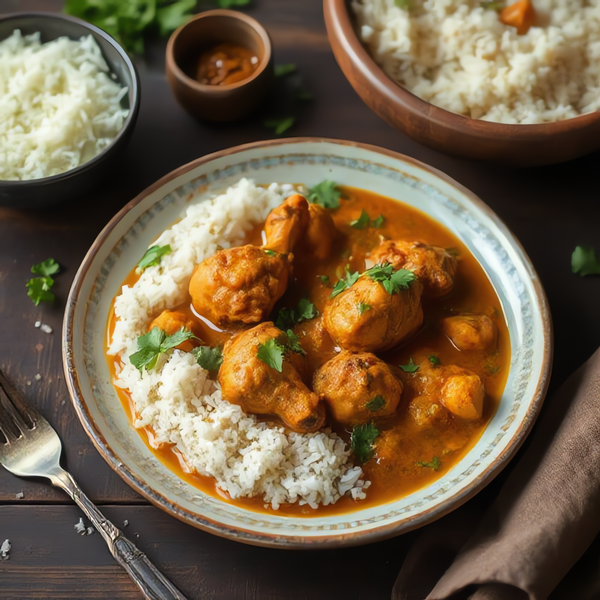Ultimate Sri Lankan Chicken Curry Recipe

Craft an outstanding chicken curry that will surpass all your previous experiences with this genuine Sri Lankan chicken curry recipe!
Marthinus StrydomThe Story
Immerse yourself in the creation of a chicken curry that's not just for special occasions, but perfect for daily indulgence, delivering an authentic taste that's rich, spicy, and bursting with complex flavors and aromas. This recipe is ideal for beginners or those just venturing into the art of curry-making, offering simplicity without compromising on taste. Opt for the convenience of boneless chicken or pre-sectioned pieces to streamline the process.
Chicken curry as a dish has its origins deeply embedded in the culinary traditions of the Indian subcontinent. With the spread of Indian culture and cuisine through trade and conquest, variations of the dish have become popular in many parts of the world, including Sri Lanka. Sri Lankan chicken curry, in particular, is a reflection of the island's history and its diverse cultural influences. The use of local spices such as cinnamon, cardamom, and cloves, combined with coconut milk and curry leaves, give the Sri Lankan chicken curry its unique and aromatic flavor profile that sets it apart from its Indian counterparts. The blend of spices and ingredients used in this recipe has been passed down through generations, with each adding their own touch to the dish, thus evolving the recipe to what it is today. The recipe mentioned is a take on the traditional Sri Lankan chicken curry, tailored to suit the modern kitchen and the availability of ingredients outside of its country of origin. This particular version strives to maintain authenticity while simplifying the process for those who may be new to cooking curries or have limited access to exotic ingredients. Interesting facts about this recipe include its adaptability; for instance, it accommodates the use of boneless chicken for ease of preparation. The recipe also reflects the cultural amalgamation of Sri Lankan cuisine by using a blend of native spices along with cooking techniques that may have been influenced by colonial and trade relationships, such as the Dutch and Portuguese, who left their mark on the island's culinary landscape. This chicken curry is not just a testament to Sri Lanka's rich gastronomic history but also an accessible way for people around the world to explore and enjoy the complex flavors of this beloved dish.

Subscripe to my Facebook page.
Subscripe to my Youtube channel.
© All recipes are copyright protected by TheCultureCook.com unless the recipe was adapated from another source. All recipes are uniquely crafted and adapted by TheCultureCook.com. Copyright of some or all of the text reside with the original author.
Ingredients
Method
Recipe Instructions
- Prepare the bone-in chicken by cutting it into smaller pieces. Each piece should be fairly small but not bite-sized. A regular chicken thigh should be cut in half and larger pieces should be cut into thirds. A chicken breast should be cut into 3 pieces or more. Keep in mind, the larger the chicken piece, the longer it will take to cook through, so aim to keep the pieces fairly uniform in size.
- Add coconut oil into a large saucepan and heat the oil over medium heat. Once hot, add chopped onions and cook until they start to soften.
- Introduce minced garlic and grated ginger to the softened onions, and sauté until the garlic begins to soften. Be vigilant to ensure it doesn't burn.
- Mix in curry powder, chili powder or cayenne pepper, paprika, cinnamon, and curry leaves. Stir the mixture and cook for a few minutes until the spices emit a fragrant aroma.
- Add the chicken, sliced serrano peppers or green chili peppers, salt (to taste), chopped roma tomatoes, and sugar. Stir everything together to coat the chicken well and cook for 10 minutes without the lid, over medium-high heat. Stir frequently to prevent the chicken or spices from burning.
- Pour in coconut milk, water, and lime juice or vinegar, then bring the curry to a boil. Adjust the amount of liquid according to your preference for gravy thickness.
- Reduce the heat and let the curry simmer covered for about 20 minutes, stirring occasionally. If you wish to reduce the liquid content in the curry, leave the lid off.
- The chicken should be thoroughly cooked at this stage, depending on the size of the pieces and the heat of your stove.
- Taste the curry and adjust the seasoning with additional salt if required. You may also add the rest of the sugar, more salt, or vinegar to tailor it to your palate. Remember, curries are quite versatile and can be tweaked to your liking!
- If the chicken curry gravy is too thin, or if you have too much of it, uncover and let the curry simmer for an additional 10 minutes or more. This step is optional and allows the water to evaporate, thickening the gravy. If you prefer more gravy, you can add more water or coconut milk, but be sure to adjust the seasoning accordingly.
- Turn off the heat and let the chicken cool down slightly before serving. This dish pairs well with rice or roti.
- For the best flavor experience, store the chicken curry in the refrigerator overnight and enjoy it the next day. (It truly tastes even better the next day!)
